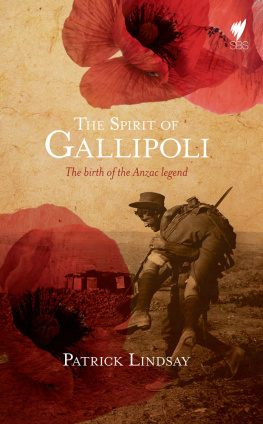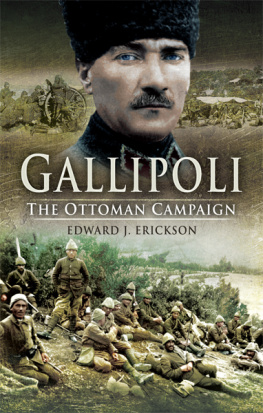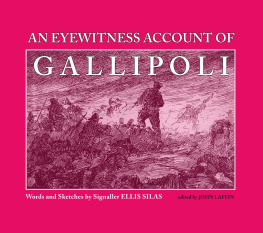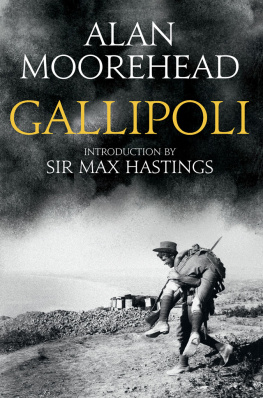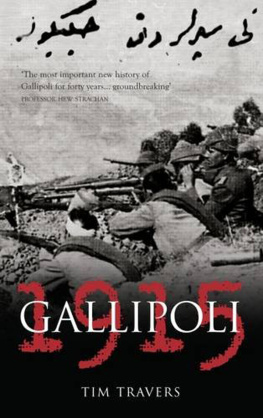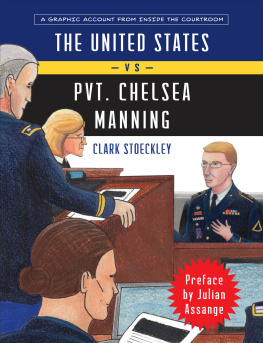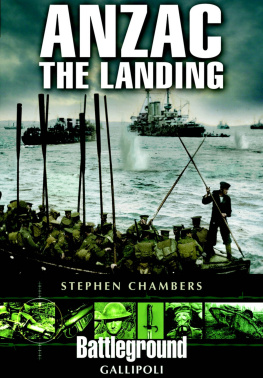MANNING CLARK ON GALLIPOLI
MUP TITLES BY MANNING CLARK
Henry Lawson: the man and the legend
A Historians Apprenticeship
A History of Australia Vols 1 & 2
A History of Australia Vols 3 & 4
A History of Australia Vols 5 & 6
A History of Australia I: from the earliest times to the age of Macquarie
A History of Australia II: New South Wales and Van Diemens Land 18821838
A History of Australia III: the beginning of an Australian civilization 18241851
A History of Australia IV: the earth abideth for ever 18511888
A History of Australia V: the people make laws 18881915
A History of Australia VI: The old dead tree and the young tree green 19161935
Manning Clarks History of Australia, abridged by Michael Cathcart
Speaking Out of Turn
Manning Clark
On Gallipoli
MELBOURNE UNIVERSITY PRESS
An imprint of Melbourne University Publishing Ltd (MUP Ltd)
187 Grattan Street, Carlton, Victoria 3053, Australia
www.mup.com.au
First published 2005
Text The estate of Charles Manning Hope Clark 2005
Design and typography Melbourne University Publishing Ltd 2005
A History of Australia Volume V first published 1981
Reprinted five times, 1987 to 1999
Text Charles Manning Hope Clark 1981
Design & typography MUP 1981
This book is copyright. Apart from any use permitted under the Copyright Act 1968 and subsequent amendments, no part may be reproduced, stored in a retrieval system or transmitted by any means or process whatsoever without the prior written permission of the publishers.
Designed by Guy Mirabella
Typeset in Australia by J & M Typesetting
Printed in Australia by Griffin Press
National Library of Australia Cataloguing-in-Publication entry
ISBN 0-522-85195-9
Clark, Manning, 19151991.
Manning Clark on Gallipoli.
ISBN 0 522 85195 9.
1. Australia - History. 2. World War, 1914-1918 - Campaigns - Turkey - Gallipoli Peninsula. 3. World War, 1914-1918 - Australia. 4. World War, 1914-1918 - Turkey. I. Clark, Manning, 1915-1991. History of Australia. II. Title. (Series : MUP masterworks).
940.41294
About this book
The MUP Masterworks series celebrates distinguished Australian writers and ideas. Manning Clark On Gallipoli, the first in the series, is drawn from Chapters 10 and 11 of Volume V of Manning Clarks History of Australia, first published in 1981; it relates the Australian experience of the early years of the First World War. Clark focuses particularly on the failed Gallipoli campaign and the terrible weeks in 1915 when the Anzac legend was forged, but his lively eye also ranges across the broad canvas of national life, vividly depicting how Australians lived and thought and argued and believed during the war.
The extract includes Clarks famous distinction between the enlargers and straiteners of public life: the men of passion and swift action, versus the cautious ones who had read their history and learned to fear dramatic change.
Throughout the History, various romantic figures recur, responding to larger events as they follow their personal doomed or glorious arcs through politics, the arts and letters, and public life. Two troubled poets, the visionary, Henry Lawson, and his younger contemporary, Christopher Brennan, are present in this excerpt, as is Alfred Deakin, slipping from his star turn as Prime Minister into a retirement clouded by a growing mental confusion sadly in keeping with the cosmic madness of the Great War.
Manning Clark On Gallipoli
On the last Sunday of June 1914 the Anglican Archbishop of Melbourne, Henry Lowther Clarke, preached the second in a series of sermons on the biblical account of creation. The Archbishop accepted evolution as a manifest working of divine forward planning. He also had a word to say about the early days of humanity as narrated in the book of Genesis. Referring to the verse and they were both naked, the man and his wife, who were not ashamed, the Archbishop explained to the congregation that clothing marked mans attempt to hide his shame. Desire did not wholly account for the use of clothing: climate also contributed. There was a damp wintry chill in the Cathedral that day, as the Archbishop concluded that the Genesis story impressed the truth that things in mans nature which were good and natural had been turned by his sins into what was base.
in Sarajevo, the capital of the province of Bosnia-Herzegovina, Gavrilo Prinzip, an eighteen-year-old whose heart was on fire with a desire to avenge the wrongs committed against his people by the Austrians, shot dead the Archduke Franz Ferdinand and his wife, formerly the Countess Sophia Chotek. Intense grief and horror were expressed in Austria-Hungary where the Archduke was greatly loved. When told the news the old Emperor, Franz Joseph, who suffered much, became deathly pale and murmured: I am spared nothing. The Emperor of Germany, Kaiser Wilhelm the Second, stood gravely silent when he heard the news. The Pope was deeply shocked.
In Australia there was widespread sympathy with the Habsburg family. The Archduke had endeared himself to Australians during his visit to Sydney in 1893 on the Austrian warship Kaiserin Elisabeth. He delighted Sydney-siders by telling them their women were superlatively beautiful, and their men light-hearted, unconventional and pleasing exponents of Austrian Gemtlichkeit. The kiss of the hand, the sparkle in the eye and the compliments charmed the women of Sydney: the men were possibly not so impressed. When the Age reported the assassination on 30 June they reminded their readers of those endearing expressions of affection for the dead man. The Argus reminded its readers that the break-up of the monarchy in Vienna would be a disaster for the whole of Europe: the monarchies stood between Europe and the revolt of the masses.
Some feared that the days of the belle poque were drawing to a close. Europe reminded observers of the point made by Gloucester in King Lear: We have seen the best of our time. In Asia, according to the Jeremiahs, Japan was about to jiu-jitsu white supremacy. The radical press accused the bourgeoisie of Europe and the British Empire of war preparations to give Tsarism a chance to repel the onset of revolution. This would mean the strengthening of the most bloody conservatism both in Europe and in parts of the British Empire like Australia. The bourgeoisie were preparing to shed rivers of blood to forestall the
In Berlin drunken officers drank toasts to Der Tag: patriots exulted over Germanys historic destiny. The initialling of the agreement to permit Germany to build the Berlin-Baghdad railway was imminent: Germany would soon be knocking at the door of India. In St Petersburg and Moscow the Slavophiles boasted that the flag of Holy Russia would soon fly over Constantinople: Russia would acquire territory and markets in Persia and India and on the shores of the Pacific. Holy Russia would save Europe from those Catholics and Protestants who had corrected Christs work, and those liberals who had corrupted the European with the idea that everything was allowable. The Russian peasant had kept alive the image of Christ in his heart. God would save Russia as He had saved her many times in her history. In the British Isles men and women put their faith in the Lord of Hosts. In France generals, admirals and politicians hungered for revenge for the defeat at Sedan. Intellectuals were fascinated by the new world of aeroplanes, motor cars and professional sport. Some foretold that the decadence and hypocrisy of France could be cured only by the sufferings of war. War would show that religious


